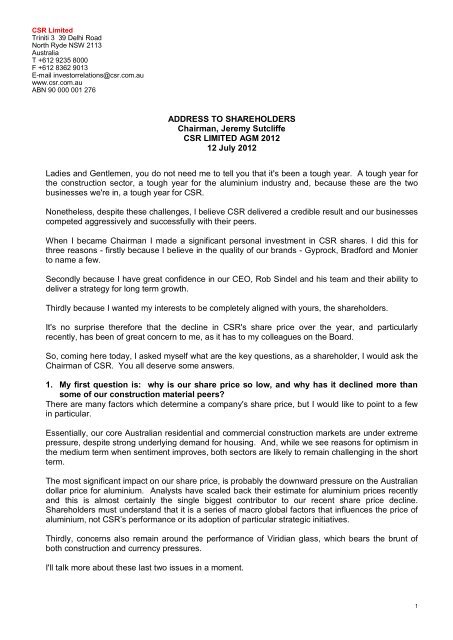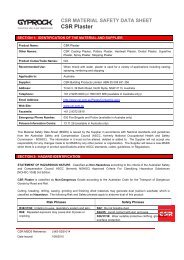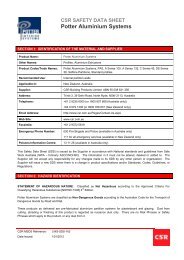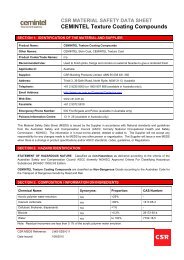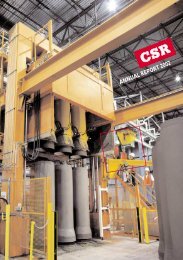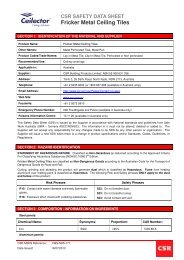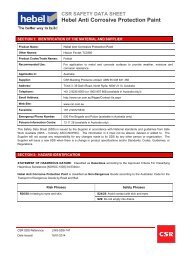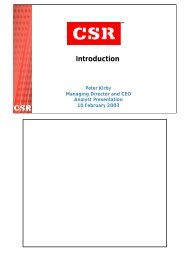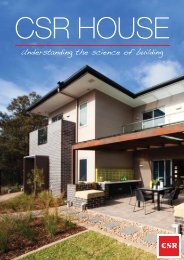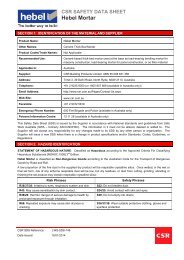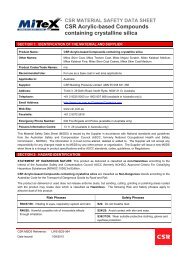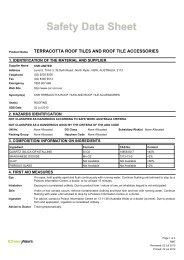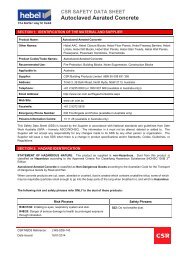Chairman Speech - CSR
Chairman Speech - CSR
Chairman Speech - CSR
Create successful ePaper yourself
Turn your PDF publications into a flip-book with our unique Google optimized e-Paper software.
<strong>CSR</strong> Limited<br />
Triniti 3 39 Delhi Road<br />
North Ryde NSW 2113<br />
Australia<br />
T +612 9235 8000<br />
F +612 8362 9013<br />
E-mail investorrelations@csr.com.au<br />
www.csr.com.au<br />
ABN 90 000 001 276<br />
ADDRESS TO SHAREHOLDERS<br />
<strong>Chairman</strong>, Jeremy Sutcliffe<br />
<strong>CSR</strong> LIMITED AGM 2012<br />
12 July 2012<br />
Ladies and Gentlemen, you do not need me to tell you that it's been a tough year. A tough year for<br />
the construction sector, a tough year for the aluminium industry and, because these are the two<br />
businesses we're in, a tough year for <strong>CSR</strong>.<br />
Nonetheless, despite these challenges, I believe <strong>CSR</strong> delivered a credible result and our businesses<br />
competed aggressively and successfully with their peers.<br />
When I became <strong>Chairman</strong> I made a significant personal investment in <strong>CSR</strong> shares. I did this for<br />
three reasons - firstly because I believe in the quality of our brands - Gyprock, Bradford and Monier<br />
to name a few.<br />
Secondly because I have great confidence in our CEO, Rob Sindel and his team and their ability to<br />
deliver a strategy for long term growth.<br />
Thirdly because I wanted my interests to be completely aligned with yours, the shareholders.<br />
It's no surprise therefore that the decline in <strong>CSR</strong>'s share price over the year, and particularly<br />
recently, has been of great concern to me, as it has to my colleagues on the Board.<br />
So, coming here today, I asked myself what are the key questions, as a shareholder, I would ask the<br />
<strong>Chairman</strong> of <strong>CSR</strong>. You all deserve some answers.<br />
1. My first question is: why is our share price so low, and why has it declined more than<br />
some of our construction material peers<br />
There are many factors which determine a company's share price, but I would like to point to a few<br />
in particular.<br />
Essentially, our core Australian residential and commercial construction markets are under extreme<br />
pressure, despite strong underlying demand for housing. And, while we see reasons for optimism in<br />
the medium term when sentiment improves, both sectors are likely to remain challenging in the short<br />
term.<br />
The most significant impact on our share price, is probably the downward pressure on the Australian<br />
dollar price for aluminium. Analysts have scaled back their estimate for aluminium prices recently<br />
and this is almost certainly the single biggest contributor to our recent share price decline.<br />
Shareholders must understand that it is a series of macro global factors that influences the price of<br />
aluminium, not <strong>CSR</strong>’s performance or its adoption of particular strategic initiatives.<br />
Thirdly, concerns also remain around the performance of Viridian glass, which bears the brunt of<br />
both construction and currency pressures.<br />
I'll talk more about these last two issues in a moment.<br />
1
2. My next question is: looking back, did <strong>CSR</strong> make the right decision in selling Sucrogen<br />
18 months ago<br />
The answer is “absolutely”. The sale price of $1.75 billion was a fantastic price for this business,<br />
equating to about 23 times ten year average Earnings Before Interest and Tax – the sale enabled<br />
us to return $800 million to shareholders and, critically, to repay all outstanding debt of the company.<br />
Largely as a result of this, we ended this year with a net cash position of $56 million. At a time of<br />
tight liquidity in debt markets and with pressure on earnings in our two operating businesses, it is<br />
great to have a balance sheet in such good shape.<br />
3. My third question: why did our Aluminium division see earnings decline by 28% last<br />
year<br />
Earnings from our investment in the Tomago smelter fell primarily because the benchmark LME<br />
aluminium price declined almost 20% during the financial year in both US dollar and Australian<br />
dollar terms while input costs, including petroleum coke, increased.<br />
As I’ve said, these are factors completely outside of our control. Our local and global industry peers<br />
have suffered similarly and we have seen the announced closure of the Kurri Kurri smelter and the<br />
federal government's assistance package at Port Henry. The share prices of aluminium companies<br />
around the world are also under pressure with Alcoa in the US, for example, down over 50% in the<br />
last year.<br />
This might be an appropriate point to mention the carbon price introduced earlier this month. <strong>CSR</strong><br />
recognises the impact of climate change but has constantly said that we do not support taxing<br />
Australian manufacturing industry, particularly where international competitiveness is impacted, as it<br />
simply drives jobs offshore.<br />
If the government is serious about carbon reduction in our sector, then the approach must be<br />
broader and also address energy efficiency in the built environment, which Rob will discuss further a<br />
bit later.<br />
<strong>CSR</strong>'s view is that, at a minimum, the price of $23 per tonne introduced on 1 July should be urgently<br />
revisited to reflect the challenges our economy faces and to bring it more in line with the price of<br />
carbon in other parts of the world where trading schemes exist.<br />
In the meantime, Tomago Aluminium is undertaking a restructure of its operations including the<br />
reduction of about 100 roles and changes to maintenance budgets as we endeavour to compete<br />
globally at current market prices.<br />
On a more positive note, Tomago has one of the lowest production costs of any aluminium<br />
producer in Australia and last year we still achieved an attractive return on our funds employed in<br />
this business.<br />
Finally on Aluminium, you may be aware that in October last year, Rio Tinto announced the<br />
formation of a new business unit to be called Pacific Aluminium, which will include its 51% share in<br />
Tomago. Rio also announced its intention to divest this new division at some point in the future.<br />
<strong>CSR</strong>'s strategy remains focused primarily on building products. We are assessing a number of<br />
options which may emerge from Rio Tinto's stated intentions, with the principle objective of ensuring<br />
that shareholder value is maximised, as a result of any change in the ownership structure of<br />
Tomago.<br />
4. My fourth question: why is Viridian glass still losing money and can you fix it<br />
The performance of Viridian continues to be extremely disappointing. Neither I nor your CEO are<br />
hiding behind the fact that we were not party to the decision to acquire Viridian in 2007. Far from it –<br />
we want to fix it, even in the face of some very strong headwinds. Turning around Viridian can<br />
deliver as much upside as a major acquisition, without the associated investment.<br />
2
Although we reported an EBIT loss of $19 million, Viridian’s EBITDA, which excludes non-cash<br />
depreciation charges and therefore - I think - better reflects Viridian’s underlying trading results, was<br />
positive at $5.3 million, and enabled a positive operating cash result to be achieved for the year.<br />
The stark reality is that with the high fixed costs associated with glass production we need a<br />
significant pick up in construction markets, and hence glass volumes, preferably combined with a<br />
lower Australian dollar to make imported glass more expensive, before we can start delivering the<br />
sort of returns that shareholders expect from Viridian.<br />
We are not resting on our laurels waiting for this to happen - we are working hard to reduce our cost<br />
base and improve operational efficiency and service to our customers. We have restructured our<br />
Primary Products line to stop production of low margin products and merged two laminating lines<br />
into one more efficient line in Victoria.<br />
In New Zealand we established a joint venture with Euroglass which will enable us to rationalise our<br />
respective glass processing sites and generate cost savings across the two businesses.<br />
5. My next question is: how is <strong>CSR</strong>’s management performing and is their remuneration<br />
appropriate<br />
These are pretty challenging times for our management team. The board remains impressed with<br />
the commitment and determination of our CEO, Rob Sindel, the executive team and all of<br />
our employees across the company. Rob has shown strong leadership and continues to put the<br />
interests of <strong>CSR</strong> first, in everything he does.<br />
It is, however, a fair question to ask whether our remuneration practices are appropriate in a year<br />
when EBIT was down 26% and the share price fell 46%. I will review this in more detail when we<br />
are preparing to vote on the remuneration report.<br />
However, it will not have escaped shareholders notice that there are a few “Positions Vacant” signs<br />
over the doors of our competitors at the moment, and we must ensure that we retain our talent and<br />
position the business for the longer term.<br />
6. My sixth question: how is <strong>CSR</strong> managing its asbestos liability<br />
I should say from the outset, that our liability is largely stable and well managed and it is good to see<br />
favourable movements in our Australian asbestos liability.<br />
However, shareholders may have noticed that, <strong>CSR</strong>’s liability in the United States has increased<br />
in recent years.<br />
This has been brought about, in large part, by an increase in settlement values, rather than the<br />
number of cases, attributable to the unique and sometimes inequitable nature of, the US legal<br />
system. Large amounts of money finds its way to plaintiff lawyers, rather than claimants, in cases<br />
which, in many instances would fail under Australian law.<br />
<strong>CSR</strong>’s primary commitment is to its shareholders and to meeting valid claims brought against it, as<br />
we do in Australia. As <strong>Chairman</strong>, I will be monitoring all claims in the United States very carefully<br />
and have requested that the management team thoroughly review our strategy and obligations in<br />
the United States to ensure we are fully utilising all avenues and rights available to us.<br />
7. Last question: so what is <strong>CSR</strong>’s strategy<br />
Rob will talk more about this in his address. Following the sale of Sucrogen, we are focusing on<br />
growing our building products business. In doing so, we are recognising the changes in housing<br />
patterns in Australia and the switch from the traditional quarter acre block to a greater focus on<br />
multi-dwelling residential developments. We have to adapt our product offering to reflect this<br />
change.<br />
Over the last 12 months, our Board has resisted the urge to grow through major acquisitions,<br />
preferring to concentrate on smaller opportunities while improving our existing businesses. This is<br />
3
undoubtedly the correct strategy in these challenging economic times, when the need to have a<br />
strong balance sheet has never been greater.<br />
Despite the very tough conditions facing <strong>CSR</strong> at the moment, it is the decisions we make now that<br />
will best position <strong>CSR</strong> as markets recover, and I am confident we have the appropriate strategy,<br />
focus and management team to grow this business for shareholders in the long term.<br />
Finally I would like to talk about the changes to the Board. Board renewal is important, particularly<br />
so for <strong>CSR</strong> over the last 18 months.<br />
John retires from the board today after serving <strong>CSR</strong> shareholders for nine years, he is our longest<br />
serving current director and chairs the Risk and Audit Committee. His counsel and experience have<br />
been invaluable to the company during a period of significant change following the demerger of<br />
Rinker in 2003 and, more recently, with the sale of Sucrogen. John, thank you very much indeed on<br />
behalf of your colleagues on the Board, management and shareholders.<br />
We are very pleased to have appointed two new directors to the board in the last year, Mike Ihlein<br />
and Rebecca McGrath. You will recall that Mike joined the board at last year’s AGM (I bet it feels<br />
like a lifetime) and brings extensive experience with him having held executive director positions<br />
with Coca-Cola Amatil as chief financial officer, and with Brambles as chief financial officer and<br />
CEO.<br />
Mike will replace John as Chair of the Risk and Audit Committee. Rebecca joined the board in<br />
February and brings extensive industry experience to <strong>CSR</strong> across several disciplines including<br />
finance, operations and marketing during her career with BP Australia.<br />
In conclusion, and as I said earlier, it has been a particularly tough year for <strong>CSR</strong> which, ultimately,<br />
reflects the state for manufacturing in Australia today. We have all elected to invest in a company<br />
which has two divisions – building products and aluminium. This is a choice we’ve made.<br />
Construction activity and the aluminium price are the main contributors to our base profitability.<br />
Management, and management strategy, should and does make a difference but it is only part of a<br />
much bigger equation.<br />
We have worked hard to reduce costs and align our production to the current market environment<br />
and we are competing very successfully. We must maintain our business to be well positioned for<br />
when markets improve. I believe we have the people and the strategy to do this.<br />
So, once again, on behalf of the board, I would like to thank our managing director Rob Sindel, his<br />
executive team and our 3,600 employees across Australia and New Zealand for their commitment<br />
to your company.<br />
Lastly, I want to thank you my fellow shareholders for your continued support of <strong>CSR</strong>.<br />
We know that you are not happy but I can assure you that <strong>CSR</strong>’s employees are busting their guts<br />
to perform in a truly difficult operating environment, working for you, the shareholders.<br />
I now ask Rob to the microphone.<br />
4


